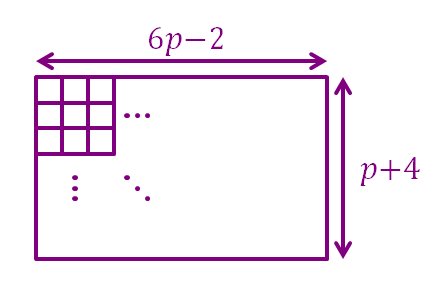Quadrectic

The grid above has width and height .
If this grid contains rectangles of dimensions with , find the greatest value of .
Details and Assumptions:
- Dimensions are expressed as width height . Thus a rectangle that is, a rectangle of width and height is considered to be different from a width , height rectangle. In this problem, you only consider the rectangles, not the ones.
This is one part of Quadrilatorics .
The answer is 16.
This section requires Javascript.
You are seeing this because something didn't load right. We suggest you, (a) try
refreshing the page, (b) enabling javascript if it is disabled on your browser and,
finally, (c)
loading the
non-javascript version of this page
. We're sorry about the hassle.
From this note , we know that the number of x × y rectangles in an a × b grid given that x ⩽ a and y ⩽ b is ( a − x + 1 ) ( b − y + 1 )
Here, we have a = 6 p − 2 , b = p + 4 , x = 3 p , y = 2 p , substitute them into the equation above we would get K = ( 6 p − 2 − 3 p + 1 ) ( p + 4 − 2 p + 1 ) = ( 3 p − 1 ) ( 5 − p ) = − 3 p 2 + 1 6 p − 5 = − 3 ( p − 3 8 ) 2 + 3 4 9 As p is an integer, and 3 8 rounded off to the nearest integer is 3, thus when p = 3 , K achieves its maximum value. ∴ K ⩽ − 3 ( 3 − 3 8 ) 2 + 3 4 9 = 1 6